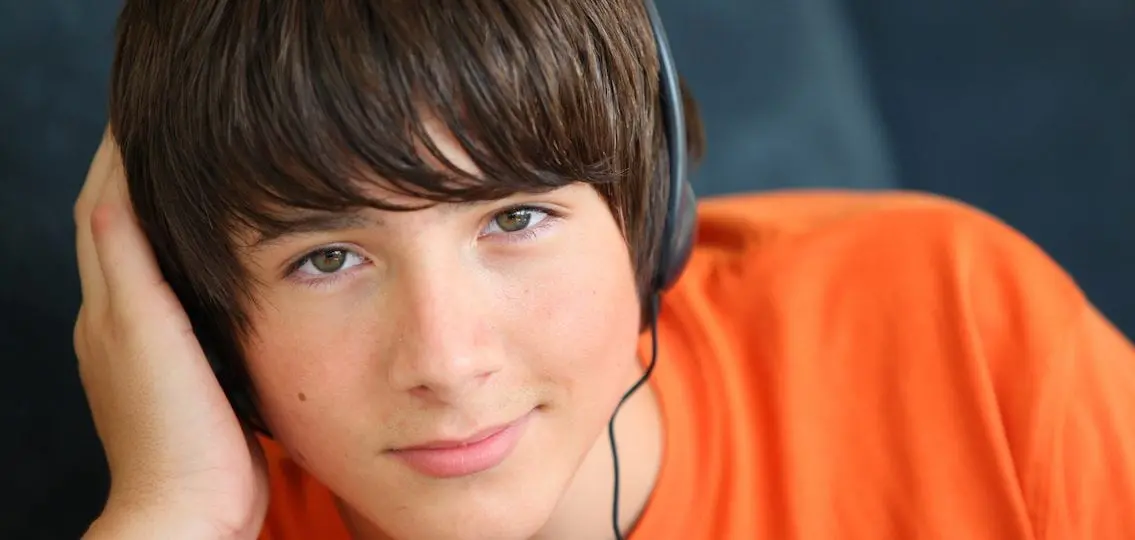Nearly one in five kids is affected by an emotional or behavioral disorder. These issues can often begin as early as preschool or kindergarten, so it’s never too soon to talk with your kids about mental health.

Listening to music with your teens is a great way to generate conversation in a non-threatening way. Recent research from the University of Arizona indicates that listening to music with your kids can help you bond with them. If a song’s lyrics spark something in them, they’ll speak up—and, before they know it, you’re having a meaningful discussion.
“In my psychotherapy practice, I’ve used song lyrics as a way to help clients express their feelings and to help them discover new insights about themselves,” says Dr. Juli Fraga, a psychologist in San Francisco.
“Song lyrics can be a relatable and useful way for parents to bring up hot-button topics with their teens,” Fraga adds. “Instead of asking kids to divulge their personal angst, lyrics offer an opportunity to ponder how the artist may have felt when writing the song, or what message the words are trying to convey.”
Don’t know where to start to get on your teen’s music level?
3 Songs About Mental Health That Can Help You Talk With Your Teen:
1. Shawn Mendes—In My Blood
Pop star Mendes wrote this song about anxiety. It’s great that Mendes is bringing awareness to this issue, especially since the Anxiety and Depression Association of America indicates 80% of children with anxiety aren’t getting the treatment they need. The song includes lyrics like, “Help me, it’s like the walls are caving in,” and “I’m crawling in my skin.” These lyrics can help kids build a vocabulary to express anxious feelings.
Mendes sings about trying to manage his anxiety: “Just have a drink and you’ll feel better/Just take her home and you’ll feel better.” It’s important to talk with kids about healthy coping strategies versus temporary fixes. Teenagers especially should be aware that self-medicating with alcohol, drugs, or sex won’t alleviate anxiety: instead, they need to develop tools to manage it. Their toolbox could include meditation, exercise, and regular appointments with a mental health professional.
Another poignant line: “Keep telling me that it gets better/Does it ever?” It’s not useful to tell your child that their anxiety will get better if you’re not part of helping them make that happen. It’s better to say, “I’m here with you, and I’m going to help you get through this.”
2. Kesha—Praying
Kids may not know that depression and anxiety can be environmental as well as biological, or vice versa. It’s important to talk about the different sources from which these feelings may arise. Kesha’s song “Praying” details her emotional, physical, and sexual abuse at the hands of music producer Lukasz “Dr. Luke” Gottwald. The song is about despair, but it’s also about healing and hope.
Kesha sings, “After everything you’ve done/I can thank you for how strong I have become.” Play this lyric for your teen and let them know that having this experience has given them strength. In the lyric, “I had to learn how to fight for myself,” Kesha’s use of the word “learn” is important: taking charge of your mental health means learning how to feel better—and learning takes practice. Help your kids understand that this is a process, and that you are along for the ride with them.
3. Logic—1-800-273-8255
This song’s title is the phone number of the National Suicide Prevention Lifeline. In an interview with Genius.com, rapper Logic came up with the idea for the song after fans told him that his music saved their lives: “It hit me, the power that I have as an artist with a voice.”
When my own kids heard this song, it definitely caught their attention. Logic sings: “I don’t wanna be alive/I just wanna die today.” My son actually gasped when he heard this line. To children, it can feel taboo to say you want to die. We need to let them know it’s okay to express these feelings, so that they can get the help they need.
Logic sings “1-800-273-8255” from the perspective of someone who calls the hotline and wants to end his life. As the song progresses, singer Alessia Cara tells him that it’ll take work for him to feel better, but that it will be worth it.
Logic ends on a hopeful note: “I finally wanna be alive/I don’t wanna die today.” Talk to your kids about the structure of this song–first, he talks about his problem; then he gets help and support; then he feels better. Tell them this is the best way to deal with distressing thoughts or feelings: once they reach out, then they can get help.

If you’re concerned that your child is experiencing anxiety, depression, or other psychological issues, contact a medical professional. You can also find helpful information on the US Department of Health Services’ mental health website.




